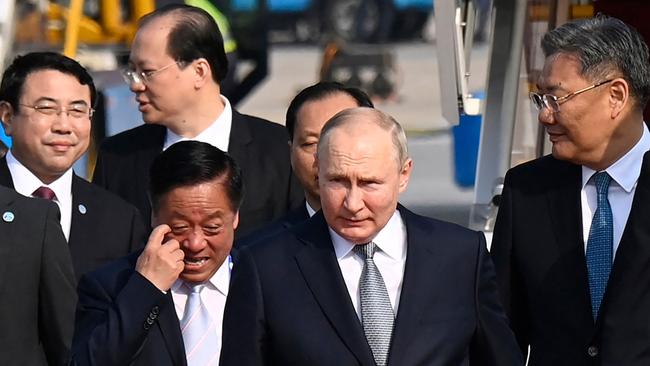Vladimir Putin special guest but we sit out Belt and Road birthday
Canberra is keeping its distance, but the leaders of two of Australia’s most important neighbours will join Vladimir Putin to celebrate Xi Jinping’s signature foreign policy initiative.

The Australian government will not be represented in any capacity at Xi Jinping’s 10-year anniversary for his Belt and Road Initiative, as Canberra continues to look warily on the $1.5 trillion project that is increasing Beijing’s influence in Southeast Asia and the Pacific.
President Xi on Wednesday will give a keynote address to mark the first decade of what he has called the “project of the century”.
In a defiant gesture to America, Europe, Japan, Australia and other supporters of Ukraine, Mr Xi has invited Vladimir Putin as the event’s guest of honour, even though Russia is not an official signatory of the BRI.
That hasn’t deterred the leaders of two of Australia’s most important neighbours, Indonesian President Joko Widodo and Papua New Guinean Prime Minister James Marape, from attending. Leaders from Vietnam, Thailand, Cambodia and Laos are also participating.
“They kind of just see China as a viable alternative to the West in terms of providing development support,” said Christoph Nedopil, director of Brisbane’s Griffith Asia Institute, who is attending the forum.
The Australian government soured on Mr Xi’s sprawling project years ago. As prime minister, Malcolm Turnbull in 2017 told China’s then premier Li Keqiang Canberra would not “sign up to a slogan when we had no control over its content or substance”, although he said Australia was open to working on specific projects.
A government spokesman confirmed late on Tuesday Prime Minister Anthony Albanese was continuing that approach.
“We engage on a case-by-case basis with infrastructure projects that are transparent and open, uphold robust standards, meet genuine need and avoid unsustainable debt burdens for recipient countries,” a Department of Foreign Affairs and Trade spokesman said.
Richard Maude, a former top Australian foreign policy official, said Canberra would continue to be “very cautious” about any kind of institutional connection to the BRI, even as Beijing refined the project in response to criticism over debt burdens and the quality of some projects.
“It remains a major initiative for President Xi. It’s a vehicle for building China’s influence, including in Southeast Asia and the Pacific,” said Mr Maude, a senior fellow at the Asia Society Policy Institute.
But he said Australia needed to recognise the infrastructure needs of its neighbours and continue to provide them with “specialist advisory services” to help them as they assess Belt and Road projects.
Under the Morrison government, Australia set up Partnerships for Infrastructure, which is based in Bangkok and helps Southeast Asian governments assess the project funding and maintenance.
While Canberra has long told Beijing it is open to working on specific projects in third countries where they stack up, the nature of China’s state sector-led approach – which favours Chinese firms – has meant this has not happened.
Mr Maude said Canberra should not be worried if an Australian company could find a way to profitably partner with a Chinese firm in the region. “If China slaps a BRI label on that, well, I don’t think we should care about that. The big thing is the quality of the project, the environmental and social sustainability. And of course, any (Australian) company is going to want to make a buck out of it.”
David Olsson, national president and chair of the Australia China Business Council, said many businesses were following this week’s summit for indications of the megaproject’s direction.
“It can’t be ignored and, while there are political dimensions to it, there are none-the-less significant business and commercial opportunities flowing out of, or related to, BRI projects,” he said.



